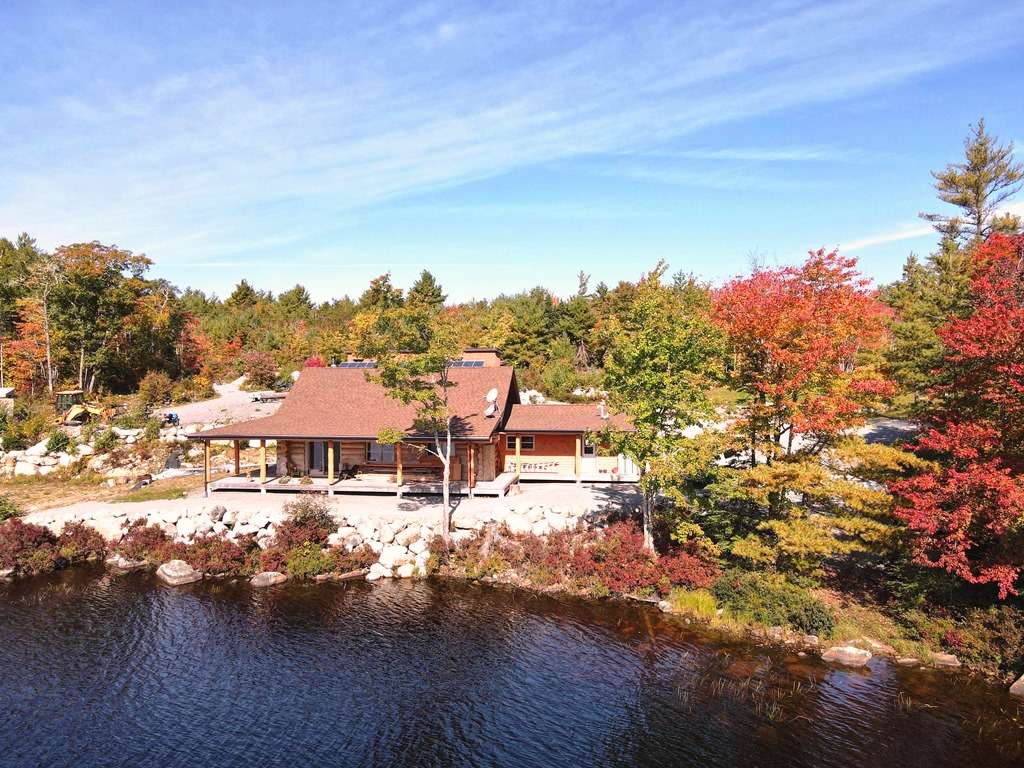If you’ve ever dreamed of living off the grid in a picturesque location, Nova Scotia might just be the perfect place for you. Located in the eastern part of Canada, this province offers favorable conditions for sustainable living. With a moderate climate, lower population density, and plenty of water in the form of high rainfall and snowfall, Nova Scotia provides an ideal environment for those looking to disconnect from the mainstream and embrace a more self-sufficient lifestyle. From the cultivation of grains, carrots, and blueberries to the possibility of harnessing renewable energy sources like solar power and wind turbines, Nova Scotia presents a plethora of opportunities for off-grid living. Moreover, its rich natural environment and tight-knit community make it a welcoming haven for those seeking a life away from the hustle and bustle of urban living.

Geographical Location and Population
Nova Scotia’s location within Canada
Nova Scotia is situated in the eastern part of Canada, surrounded by the Atlantic Ocean. It is one of the ten provinces and three territories that make up the country of Canada. The province is located on the eastern coast of the North American continent and is bordered by New Brunswick to the west.
Population of Nova Scotia
Nova Scotia has a population of approximately 975,000 people. While it may not be as densely populated as some other provinces in Canada, it still has a vibrant and diverse community. The population is distributed across various cities, towns, and rural areas throughout the province.
Favorable Conditions for Off-Grid Living
Moderate climate
Nova Scotia enjoys a moderate climate, which makes it favorable for off-grid living. The province experiences mild summers and cold winters, with temperatures ranging from -1°C (30°F) in winter to 25°C (77°F) in summer. This moderate climate allows for a higher level of self-sustainability and reduces the need for excessive energy consumption.
Lower population density
Compared to other provinces in Canada, Nova Scotia has a lower population density. This means that there is more space available for off-grid living. The lower population density also contributes to a sense of solitude and privacy, making it an ideal environment for those seeking a self-sustainable lifestyle.
Affordable housing and property
One of the advantages of off-grid living in Nova Scotia is the affordability of housing and property. The cost of housing and property in Nova Scotia is generally in line with the national average, making it more accessible for individuals looking to live off the grid. This affordability allows individuals to allocate their resources towards sustainable living practices and renewable energy sources.
Overview of Nova Scotia
Main city and smaller towns
The main city in Nova Scotia is Halifax, which has a population of over 100,000 people. Halifax serves as the provincial capital and is a hub for cultural, economic, and educational activities in the region. Besides Halifax, Nova Scotia is also home to several smaller towns and cities, each with its own unique charm and character.
Maritime climate
Nova Scotia has a maritime climate, influenced by its proximity to the Atlantic Ocean. This climate is characterized by mild summers and cold winters. The maritime climate brings moderate rainfall throughout the year, providing ample water resources for off-grid living and sustainable agriculture.
Agricultural potential
While the local climate in Nova Scotia may not be ideal for large-scale farming, there are areas within the province that can support agricultural activities. Some regions of Nova Scotia have fertile soil and favorable conditions for the cultivation of crops such as grains, carrots, and blueberries. This agricultural potential allows for a degree of self-sufficiency, with the ability to grow food and sustain a living off the land.
Abundance of water
With its proximity to the Atlantic Ocean and the presence of numerous lakes and rivers, Nova Scotia has a plentiful supply of water resources. The province experiences significant rainfall and snowfall throughout the year, ensuring a constant supply of freshwater. This abundance of water is essential for off-grid living, providing opportunities for water collection, irrigation, and hydroelectric power generation.
Diverse wildlife
Nova Scotia is home to a diverse range of wildlife, both on land and in the surrounding waters. From majestic whales in the Atlantic Ocean to bears, beavers, and various fish species in the inland areas, the province offers a unique opportunity to coexist with nature. This diverse wildlife provides an enriching experience for individuals living off the grid, allowing them to appreciate and connect with the natural environment.
Renewable Energy Sources
Solar power
Nova Scotia receives a substantial amount of sunlight, making solar power an attractive option for off-grid living. Solar panels can be utilized to generate electricity, providing a sustainable and renewable source of energy. With advances in solar technology, it is now more affordable and efficient to harness the power of the sun in Nova Scotia.
Wind turbines
The coastal areas of Nova Scotia experience consistent winds, making them ideal locations for wind turbines. Wind-generated electricity is another renewable energy source that can be used for off-grid living. Wind turbines can be set up on private property, allowing individuals to generate their own electricity while minimizing their reliance on traditional power sources.

Legality of Off-Grid Living
Living off the grid in Nova Scotia
Living off the grid in Nova Scotia is legal, and individuals have the freedom to pursue self-sustainable lifestyles. However, it is important to understand and comply with local laws and regulations. Building codes, zoning regulations, and environmental permits may still apply, ensuring the safety and well-being of both individuals and the surrounding environment.
Compliance with local laws and regulations
When choosing to live off the grid in Nova Scotia, it is crucial to comply with local laws and regulations governing land use, construction, waste management, and renewable energy systems. Obtaining the necessary permits and adhering to the required standards ensures that off-grid living practices are sustainable and do not pose a risk to the community or the environment.
Cost of Land and Property
Price variation based on location
The cost of land and property in Nova Scotia can vary based on location. Coastal areas and popular tourist destinations tend to have higher prices, while inland regions may offer more affordable options. The range in prices provides individuals with the opportunity to choose a location that aligns with their budget and off-grid living goals.
Comparison to national average
Overall, the cost of land and property in Nova Scotia is generally in line with the national average. This affordability makes Nova Scotia an attractive destination for individuals seeking off-grid living opportunities. With the ability to acquire property at a reasonable cost, individuals can allocate their resources towards sustainable infrastructure and energy systems, further enhancing their off-grid living experience.
Cost of Living
Comparison to national average
The cost of living in Nova Scotia is generally on par with the national average. While there may be some variations based on location and individual lifestyle choices, Nova Scotia offers a relatively affordable living environment. This affordability, coupled with the potential for self-sustainability, makes living off the grid in Nova Scotia an economically viable choice.
Industries in Nova Scotia
Overview of various industries
Nova Scotia boasts a diverse range of industries that contribute to the province’s economy. Agriculture, fishing, forestry, mining, transport, and gas extraction are some of the key industries in the region. The presence of these industries provides opportunities for individuals seeking off-grid living to engage in self-sustainable practices such as farming, fishing, and other activities that align with their lifestyle choices.
Opportunities for self-sustainability
The variety of industries in Nova Scotia presents opportunities for individuals to achieve self-sustainability. Whether through growing their own food, accessing local resources, or participating in the local economy, individuals living off the grid can take advantage of the existing industries to support their self-sustainable lifestyles. This integration with local industries also fosters a sense of community and collaboration.
Natural Disasters
Types of natural disasters
Like any region, Nova Scotia is susceptible to natural disasters. These can include floods, landslides, blizzards, storms, and hurricanes. While the frequency and severity of these events may vary, it is important for individuals living off the grid to be prepared and take precautions to minimize the impact of natural disasters on their daily lives.
Precautions for off-grid living
Living off the grid in Nova Scotia requires individuals to be prepared for natural disasters and have contingency plans in place. This can include having emergency food supplies, adequate shelter, and backup energy sources to sustain oneself during times of crisis. Being proactive and taking precautions ensures the safety and well-being of individuals living off the grid.
Supportive Environment for Off-Grid Living
Natural surroundings
Nova Scotia offers a rich natural environment that is conducive to off-grid living. The province’s scenic landscapes, abundant wildlife, and proximity to the ocean provide individuals with a unique opportunity to reconnect with nature. The tranquility and beauty of the natural surroundings contribute to a sense of peace and serenity, making Nova Scotia an inviting destination for those seeking an off-grid lifestyle.
Community support
Nova Scotia has a supportive community that embraces sustainable living practices and off-grid lifestyles. There are local organizations and groups dedicated to promoting self-sustainability, renewable energy, and environmental conservation. This community support network provides individuals with the resources, knowledge, and camaraderie needed to thrive in their off-grid endeavors.
In conclusion, Nova Scotia offers a favorable environment for off-grid living due to its moderate climate, lower population density, and affordability of housing and property. The province’s main city, smaller towns, maritime climate, agricultural potential, abundance of water, diverse wildlife, and supportive community all contribute to an enriching off-grid living experience. With access to renewable energy sources, compliance with local laws and regulations, and precautions taken for natural disasters, individuals can embrace a self-sustainable lifestyle in Nova Scotia.




